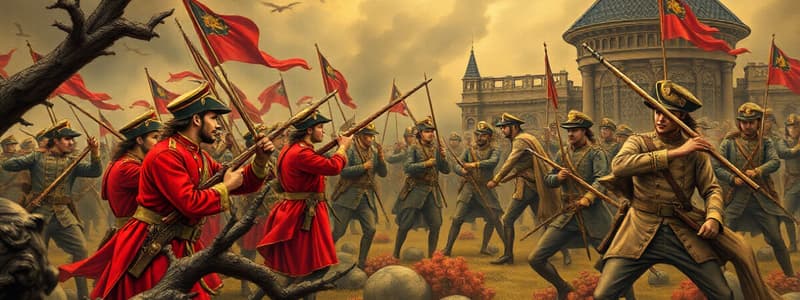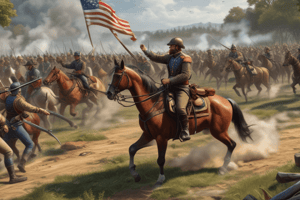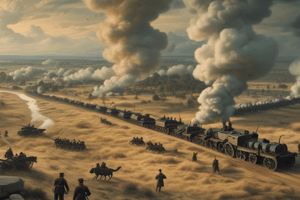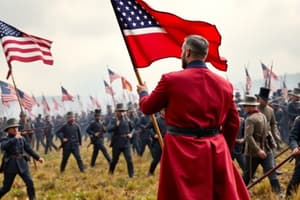Podcast
Questions and Answers
What major benefit did the Union Army gain after the battles mentioned?
What major benefit did the Union Army gain after the battles mentioned?
- Exclusive trade agreements with Europe
- Control of the Mississippi River (correct)
- Control over the Atlantic Ocean
- Negotiation of a peace treaty
What was the primary purpose of the Enrollment Act issued by Lincoln in 1863?
What was the primary purpose of the Enrollment Act issued by Lincoln in 1863?
- To recruit international soldiers
- To implement a military draft (correct)
- To promote voluntary military service
- To reduce the size of the military
Which military strategy did General Sherman employ during his campaign through Georgia?
Which military strategy did General Sherman employ during his campaign through Georgia?
- Defensive positioning and fortification
- Attrition warfare with minimal civilian impact
- Scorched Earth Policies (correct)
- Establishment of supply lines for the Confederacy
How did the telegraph serve Lincoln's leadership during the Civil War?
How did the telegraph serve Lincoln's leadership during the Civil War?
What was the significance of Britain and France remaining neutral during the Civil War?
What was the significance of Britain and France remaining neutral during the Civil War?
Which territories were proposed to become slave states in the Crittenden Compromise?
Which territories were proposed to become slave states in the Crittenden Compromise?
What action did South Carolina take following the rejection of the Crittenden Compromise?
What action did South Carolina take following the rejection of the Crittenden Compromise?
How did President James Buchanan view the authority of the federal government regarding a state's secession?
How did President James Buchanan view the authority of the federal government regarding a state's secession?
What event marked the official beginning of the Civil War?
What event marked the official beginning of the Civil War?
Which state was the first to secede from the Union?
Which state was the first to secede from the Union?
What was one of the strengths of the Union during the Civil War?
What was one of the strengths of the Union during the Civil War?
Who was the Confederate president during the Civil War?
Who was the Confederate president during the Civil War?
What role did General P.G.T. Beauregard play in the Civil War?
What role did General P.G.T. Beauregard play in the Civil War?
What was the primary purpose of the Emancipation Proclamation issued by Lincoln?
What was the primary purpose of the Emancipation Proclamation issued by Lincoln?
Which speech did Lincoln deliver to emphasize the nation's democratic ideals and the struggle against slavery?
Which speech did Lincoln deliver to emphasize the nation's democratic ideals and the struggle against slavery?
What unique challenge did the 54th Massachusetts regiment face compared to their white counterparts?
What unique challenge did the 54th Massachusetts regiment face compared to their white counterparts?
What was the approximate estimated total number of casualties (killed, wounded, and missing) during the Civil War?
What was the approximate estimated total number of casualties (killed, wounded, and missing) during the Civil War?
Who was the leader of the 54th Massachusetts regiment?
Who was the leader of the 54th Massachusetts regiment?
What portion of the population did the estimated 620,000 Civil War deaths represent in 1865?
What portion of the population did the estimated 620,000 Civil War deaths represent in 1865?
Which group primarily supported Lincoln’s re-election in the Election of 1864?
Which group primarily supported Lincoln’s re-election in the Election of 1864?
What significant battle did Colonel Shaw and half of his regiment die during?
What significant battle did Colonel Shaw and half of his regiment die during?
What was the main goal of the group that formed the Republican Party in 1854?
What was the main goal of the group that formed the Republican Party in 1854?
Which notable event involved John Brown's attempt to provide local slaves with weapons?
Which notable event involved John Brown's attempt to provide local slaves with weapons?
What was Abraham Lincoln's situation regarding the Southern votes in the 1860 election?
What was Abraham Lincoln's situation regarding the Southern votes in the 1860 election?
Which statement best describes Stephen A. Douglas in the Lincoln-Douglas debates?
Which statement best describes Stephen A. Douglas in the Lincoln-Douglas debates?
Which state was the first to secede from the Union after Lincoln's 1860 election victory?
Which state was the first to secede from the Union after Lincoln's 1860 election victory?
What was the public perception of Lincoln's election victory in the South?
What was the public perception of Lincoln's election victory in the South?
How did John Brown's rebellion impact Southern sentiments towards abolitionists?
How did John Brown's rebellion impact Southern sentiments towards abolitionists?
What method did Lincoln use to arrive at the debates compared to Douglas?
What method did Lincoln use to arrive at the debates compared to Douglas?
What was the primary purpose of the Freedmen's Bureau established in 1865?
What was the primary purpose of the Freedmen's Bureau established in 1865?
What was the outcome of the case Plessy v. Ferguson in 1896?
What was the outcome of the case Plessy v. Ferguson in 1896?
How did sharecropping affect the economic status of Black Americans by 1900?
How did sharecropping affect the economic status of Black Americans by 1900?
What political group clashed with President Andrew Johnson during Reconstruction?
What political group clashed with President Andrew Johnson during Reconstruction?
What legislation effectively ended Reconstruction in 1877?
What legislation effectively ended Reconstruction in 1877?
What were Jim Crow Laws primarily designed to do?
What were Jim Crow Laws primarily designed to do?
Which of the following accurately describes the effect of literacy tests and poll taxes?
Which of the following accurately describes the effect of literacy tests and poll taxes?
What was the primary consequence of ex-Confederates regaining power in Southern states?
What was the primary consequence of ex-Confederates regaining power in Southern states?
What was the primary goal of the Wilmot Proviso introduced by Congressman David Wilmot?
What was the primary goal of the Wilmot Proviso introduced by Congressman David Wilmot?
Which state was admitted as a free state as a part of the Compromise of 1850?
Which state was admitted as a free state as a part of the Compromise of 1850?
What aspect of the Compromise of 1850 was aimed at appeasing the South?
What aspect of the Compromise of 1850 was aimed at appeasing the South?
What was the outcome of the Dred Scott decision of 1857?
What was the outcome of the Dred Scott decision of 1857?
What was the primary consequence of the Kansas-Nebraska Act of 1854?
What was the primary consequence of the Kansas-Nebraska Act of 1854?
Which group opposed the expansion of slavery in the West and formed the Free Soil Party?
Which group opposed the expansion of slavery in the West and formed the Free Soil Party?
What was a significant result of the Fugitive Slave Act included in the Compromise of 1850?
What was a significant result of the Fugitive Slave Act included in the Compromise of 1850?
What was the main issue that the Kansas-Nebraska Act aimed to address?
What was the main issue that the Kansas-Nebraska Act aimed to address?
What was the main argument of those opposing the expansion of slavery in the West during the formation of the Free Soil Party?
What was the main argument of those opposing the expansion of slavery in the West during the formation of the Free Soil Party?
What did the Treaty of Guadalupe-Hidalgo accomplish?
What did the Treaty of Guadalupe-Hidalgo accomplish?
Flashcards
Wilmot Proviso
Wilmot Proviso
A proposed amendment in 1846 that aimed to ban slavery in any territories acquired from Mexico. It was rejected in the Senate due to a lack of support by the Democratic Party.
Treaty of Guadalupe Hidalgo
Treaty of Guadalupe Hidalgo
The treaty signed in 1848 that officially ended the Mexican-American War. It gave a vast amount of land (including California) to the USA, but it also sparked fierce debates about slavery in these newly acquired territories.
Popular Sovereignty
Popular Sovereignty
The idea that people residing in a territory should decide on whether to allow slavery or not. This was a central issue in the 1850s that led to violent conflict.
Compromise of 1850
Compromise of 1850
Signup and view all the flashcards
Fugitive Slave Act
Fugitive Slave Act
Signup and view all the flashcards
Bleeding Kansas
Bleeding Kansas
Signup and view all the flashcards
Dred Scott Case
Dred Scott Case
Signup and view all the flashcards
Free Soil Party
Free Soil Party
Signup and view all the flashcards
Know-Nothing Party
Know-Nothing Party
Signup and view all the flashcards
Kansas-Nebraska Act
Kansas-Nebraska Act
Signup and view all the flashcards
Republican Party (1854)
Republican Party (1854)
Signup and view all the flashcards
Lincoln-Douglas Debates (1858)
Lincoln-Douglas Debates (1858)
Signup and view all the flashcards
Secession
Secession
Signup and view all the flashcards
John Brown's Raid (1859)
John Brown's Raid (1859)
Signup and view all the flashcards
Lincoln's 1860 Election Victory
Lincoln's 1860 Election Victory
Signup and view all the flashcards
Crittenden Compromise
Crittenden Compromise
Signup and view all the flashcards
South Carolina's Secession (1860)
South Carolina's Secession (1860)
Signup and view all the flashcards
Turning Points of the Civil War
Turning Points of the Civil War
Signup and view all the flashcards
Cotton Diplomacy
Cotton Diplomacy
Signup and view all the flashcards
Scorched Earth Policy
Scorched Earth Policy
Signup and view all the flashcards
Lincoln's Use of Technology
Lincoln's Use of Technology
Signup and view all the flashcards
Enrollment Act 1863 (Draft)
Enrollment Act 1863 (Draft)
Signup and view all the flashcards
Secession of South Carolina
Secession of South Carolina
Signup and view all the flashcards
Buchanan's Stance on Secession
Buchanan's Stance on Secession
Signup and view all the flashcards
Confederate States of America
Confederate States of America
Signup and view all the flashcards
Fort Sumter
Fort Sumter
Signup and view all the flashcards
Union Strength - Population
Union Strength - Population
Signup and view all the flashcards
Confederate Strength - Military Leadership
Confederate Strength - Military Leadership
Signup and view all the flashcards
Confederate President
Confederate President
Signup and view all the flashcards
Emancipation Proclamation
Emancipation Proclamation
Signup and view all the flashcards
Gettysburg Address
Gettysburg Address
Signup and view all the flashcards
54th Massachusetts
54th Massachusetts
Signup and view all the flashcards
Black Soldiers' Discrimination
Black Soldiers' Discrimination
Signup and view all the flashcards
Second Battle of Fort Wagner
Second Battle of Fort Wagner
Signup and view all the flashcards
Civil War Casualties
Civil War Casualties
Signup and view all the flashcards
Impact on Families
Impact on Families
Signup and view all the flashcards
American Civil War: Bloodiest Conflict
American Civil War: Bloodiest Conflict
Signup and view all the flashcards
14th Amendment
14th Amendment
Signup and view all the flashcards
15th Amendment
15th Amendment
Signup and view all the flashcards
Freedmen's Bureau
Freedmen's Bureau
Signup and view all the flashcards
Black Codes
Black Codes
Signup and view all the flashcards
Sharecropping
Sharecropping
Signup and view all the flashcards
Jim Crow Laws
Jim Crow Laws
Signup and view all the flashcards
Plessy v. Ferguson
Plessy v. Ferguson
Signup and view all the flashcards
Study Notes
Period 5 Big Ideas Presentation (1844-1877)
-
Manifest Destiny: Driven by desires for resources and economic/religious opportunities, increased migration westward occurred. Manifest Destiny philosophy advocated America's right to expand across the continent between the Atlantic and Pacific Oceans. The Gold Rush (1848) significantly boosted Western population, attracting many immigrants, notably Chinese.
-
Mexican-American War (1836-1845): Disputes over Texas' annexation and the border (Nueces vs. Rio Grande River) led to war. The U.S. victory resulted in substantial territorial gains (including California, New Mexico, and Arizona). The Mexican Cession (1848) formally ended the war and transferred vast territory, raising questions about the expansion of slavery in newly acquired regions.
-
Compromise of 1850: Attempts to manage growing sectional tensions, including the issue of slavery in newly acquired territories, led to the Compromise. Key components included California as a free state, the Fugitive Slave Act, and popular sovereignty. This compromise did not fully resolve the debate about slavery.
-
Failure of Compromise: Subsequent events such as the Kansas-Nebraska Act (1854) led to further conflict. The repeal of the Missouri Compromise and the Wilmot Proviso debate fueled the debate over slavery. The violence of Bleeding Kansas and the Dred Scott decision demonstrated a lack of compromise solutions to the growing controversy.
-
Lincoln-Douglas Debates (1858): These debates highlighted the intensifying sectional conflict over slavery. The debates focused on whether slavery should be allowed to expand to new territories and featured Lincoln's strong anti-slavery stance. They contributed to Lincoln's rising profile.
-
Election of 1860 and Secession: Lincoln's election triggered the secession of Southern states due to fears of a threat to their way of life and beliefs concerning slavery. South Carolina was the first to secede, followed by other Southern states. The Compromise of 1860, though put forward, was not accepted, highlighting the deepening political crisis and culminating in the Civil War.
-
Fort Sumter: Confederate forces attacked Fort Sumter, which marked the beginning of the Civil War (1861). The attack initiated hostilities between the Confederate States of America and the Union, rapidly escalating the conflict.
-
Civil War Strengths and Weaknesses: The Union, with a larger population and industrial base, had a significant advantage over the Confederacy. The Confederacy, however, had skilled military leadership, notably Robert E. Lee.
-
Union Generals: Ulysses S. Grant emerged as a key Union military leader, taking control of the Union Army and achieving decisive victories. Other generals like Winfield Scott and George McClellan played significant, yet ultimately less successful roles.
-
Confederate Generals: Robert E. Lee led the Confederate Army, displaying skill and tactical prowess, but ultimately the Union proved stronger.
-
Civil War Fighting: Key battles like Gettysburg and Vicksburg were turning points in the conflict. The Union's control of the Mississippi River and their military strategy contributed to the Union's ultimate victory.
-
Government Policies during the Civil War: Lincoln's leadership, notably the Emancipation Proclamation (1863), redefined the war's purpose. The proclamation freed enslaved people in Confederate states, marking a crucial turning point in the Civil War.
-
54th Massachusetts Regiment: The notable role of Black soldiers in the Union Army challenged prevailing racial prejudices. The 54th Massachusetts regiment, for example, faced significant prejudice and discrimination.
-
Civil War Casualties: The Civil War was immensely devastating, costing thousands of American lives and altering the course of the nation.
-
Lincoln's Assassination: Lincoln was assassinated in April 1865, further impacting the nation already reeling from the conflict.
-
Reconstruction: The period after the Civil War, marked by attempts to rebuild the nation. Attempts to grant rights to previously enslaved people and to restore the southern states to the Union were met with resistance. Key events included the passage of the 13th, 14th, and 15th Amendments, and the establishment of the Freedmen's Bureau. However, these efforts also faced significant obstacles.
-
Failure of Reconstruction: Reconstruction ultimately failed as segregation, violence, and Supreme Court decisions led to the dismantling of civil liberties for Black Americans, notably the Jim Crow laws. The process resulted in a lasting legacy of racial inequality in the U.S..
-
Texas in the Civil War: Texas played a role in the secession movement, with a final battle during the conflict at Palmetto Ranch in 1865.
Studying That Suits You
Use AI to generate personalized quizzes and flashcards to suit your learning preferences.




